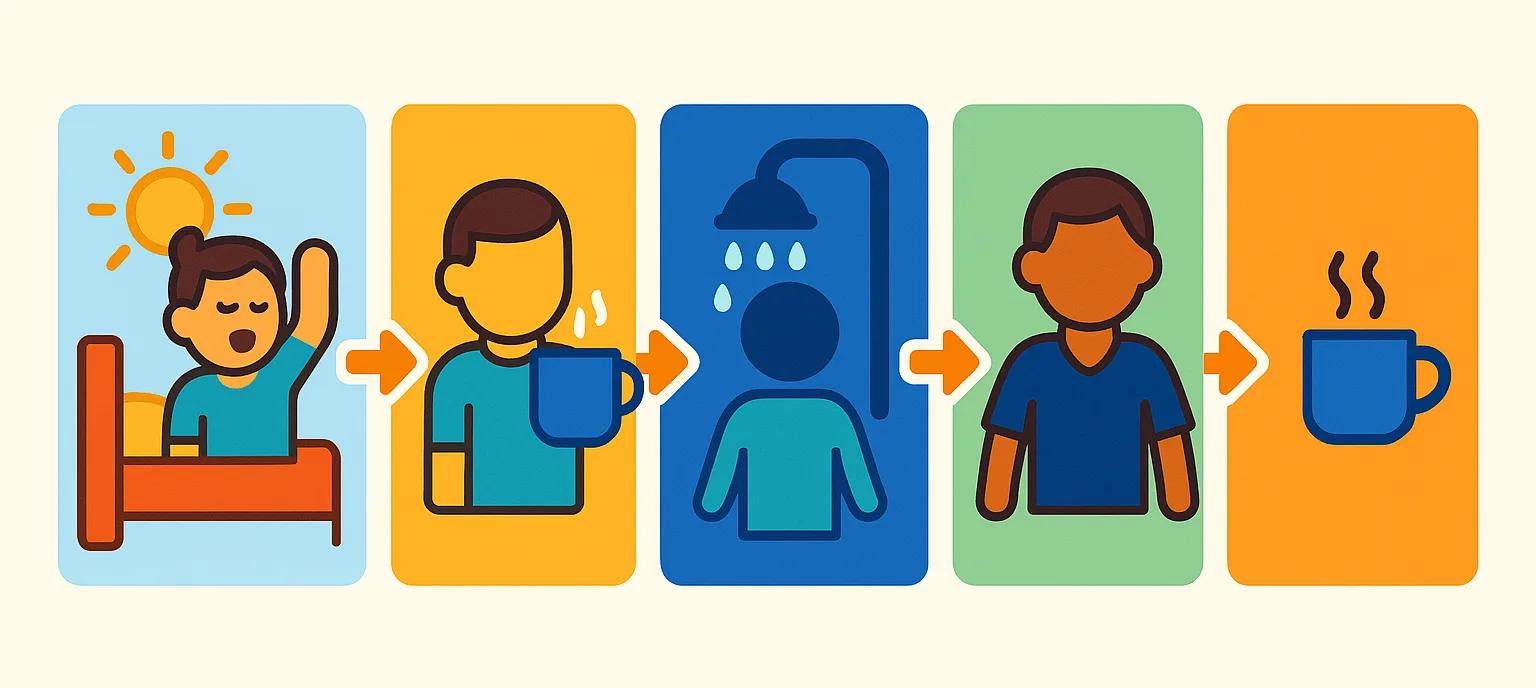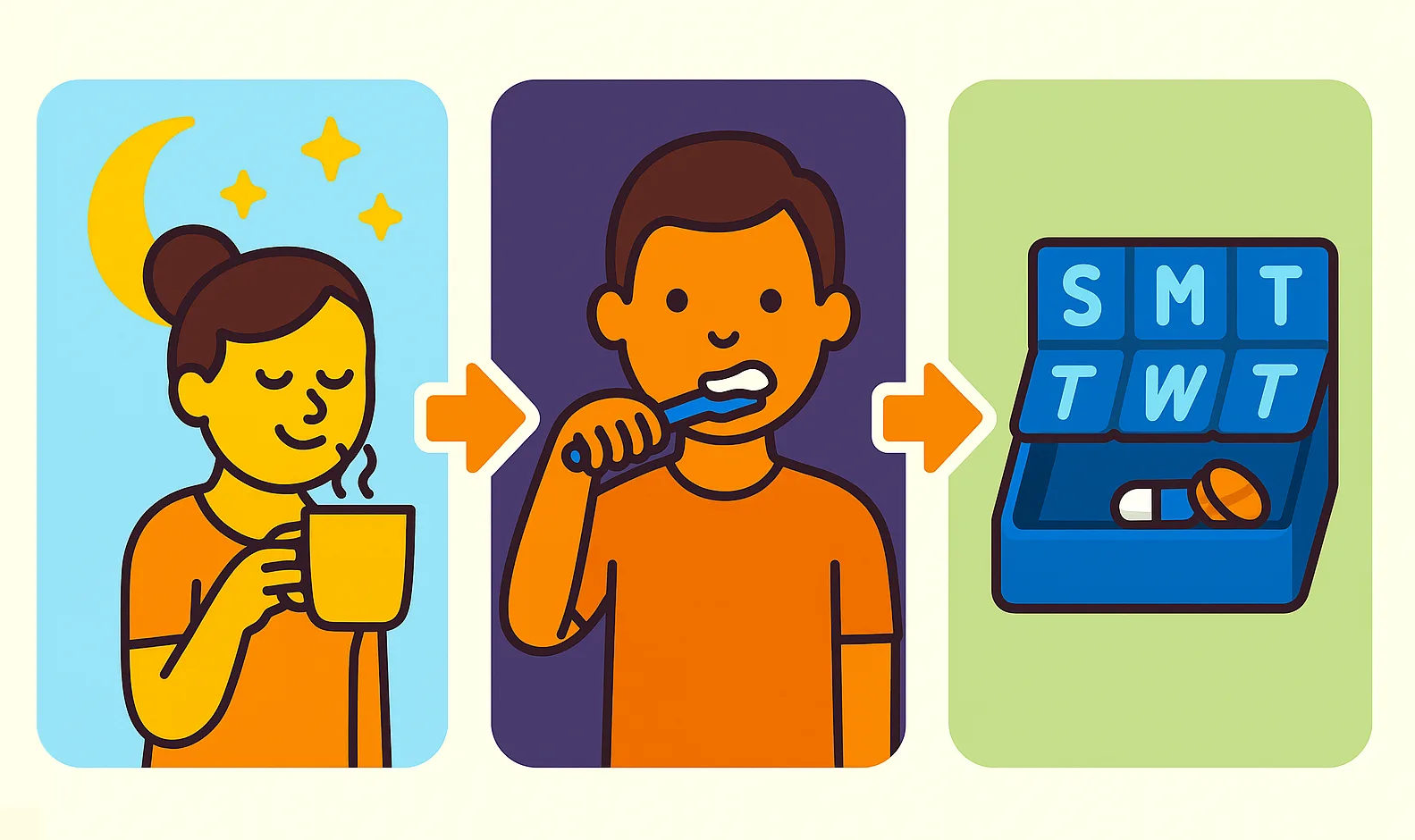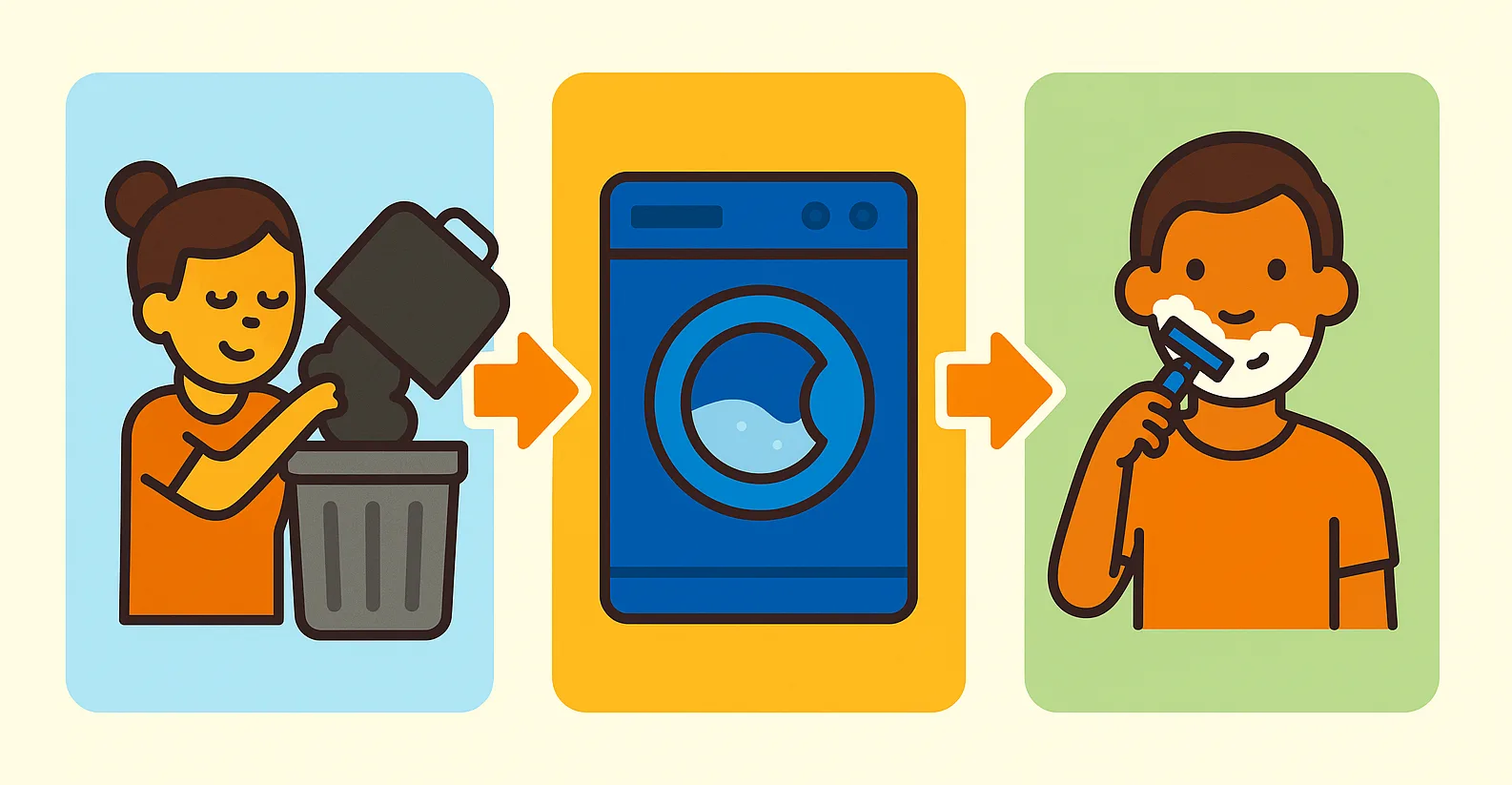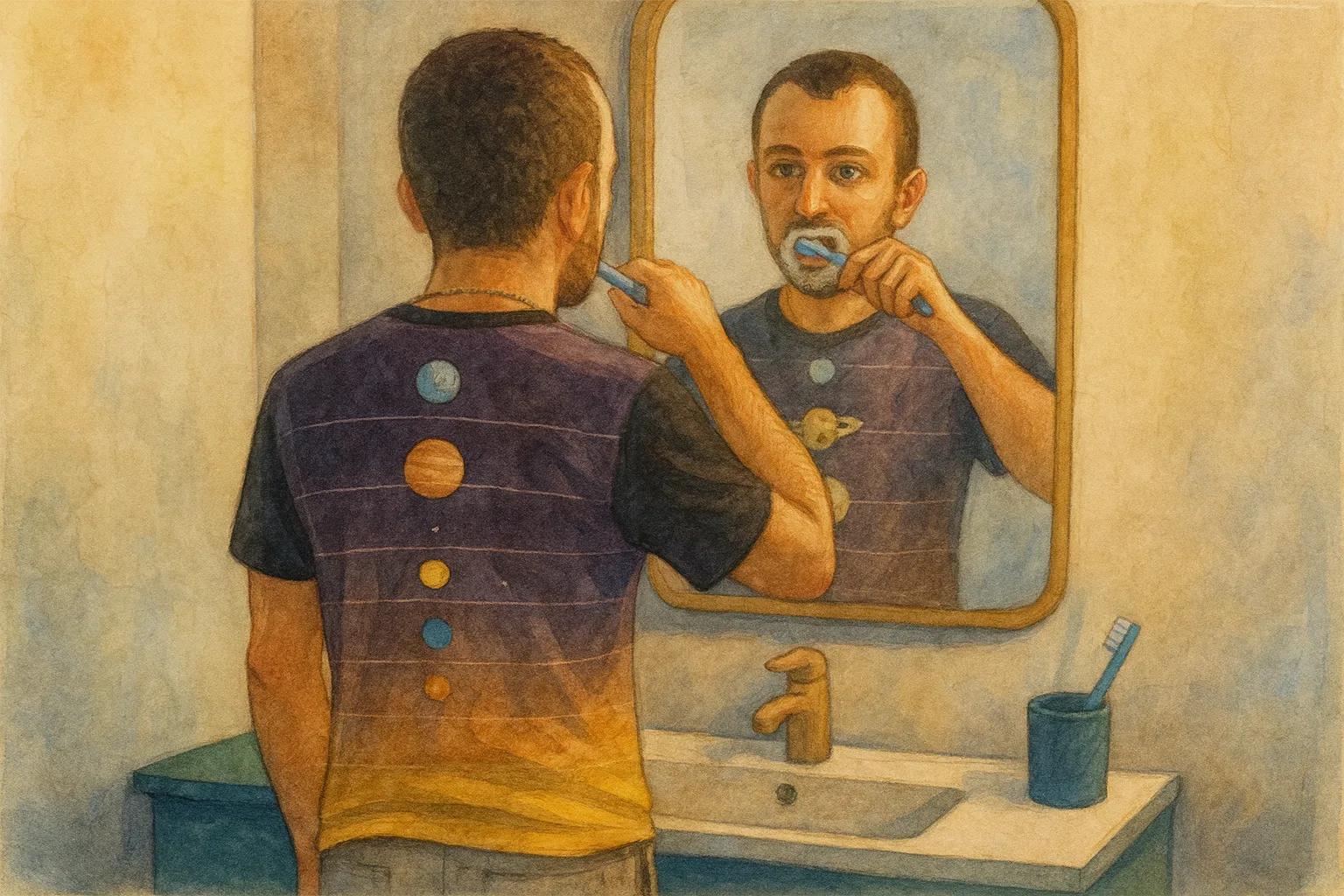Routines are part of the diagnostic criteria for ASD—autism. They involve sequences of repetitive actions, gestures, or behaviors. Behind this somewhat dull medical criterion lies a daily reality for many autistic people who experience it in a much more vivid way. Each repeated gesture is in fact a compass for the autistic person, guiding their day. Routines provide them with structure and organization.
📋 TL;DR: In short words
- Routines (criterion B ASD): repetitive daily actions and sequences (e.g., brushing teeth) that are functional.
- Why they are useful: they stabilize, calm, organize, conserve energy, and promote sensory regulation.
- Possible rigidity: interruption or change can cause anxiety or autistic crises.
- Difference from rituals: routines = practical, rituals = soothing but symbolic actions.
Routines fall under criterion B of the diagnosis defined by the DSM-5 (the diagnostic manual for mental disorders), but are not essential on their own. Criterion B includes: routines and rituals, specific interests, stereotypical behaviors, and sensory hypo- and hypersensitivities. Two of these signs must be present for a diagnosis, although often the entire criterion B is present.
Les routines constituent un rôle central dans la régulation sensorielle, émotionnelle et cognitive des personnes autistes (SimplePsychology). Elles les mettent en place parfois automatiquement, parfois volontairement, pour structurer leur quotidien. Elles ont plusieurs rôles :
- Predictability and security: they reduce unpredictability and anxiety and add a sense of control.
- Organization and energy conservation: less fatigue thanks to stable movements.
- Sensory regulation when they include sensory stimulation (stim).
They are often rigid, meaning that they can sometimes cause anxiety, anger, or even autistic crises if they are interrupted or prevented. The National Autistic Society has published an article on their calming role. The NHS also mentions this difficulty among autistic adults with change, adherence to routines, and discomfort when they are disrupted. But they usually provide pleasure for the person concerned, a certain security or comfort. They are often positive for them. They follow an internal logic that is consistent for the autistic person.
I mentioned rituals, so it is important to distinguish them from routines. I explain the difference in more detail in my article on rituals. Routines are practical, functional sequences of everyday activities (e.g., brushing your teeth, always in the same way). Rituals, on the other hand, are more symbolic, like repetitive gestures intended to calm anxiety without any direct functional purpose (e.g., always putting your pens away in a certain order before writing).
My routines
I have three main routines. The morning routine, the Sunday routine, and the evening routine. The morning routine is the most complex and the one that causes me the most anxiety if I am prevented from completing it. This happened a few days ago for the first time in several years.
My morning routine
My morning routine is the most complex:
- Step 1: I get up.
- Step 2: I arrange my blanket neatly on the bed.
- Step 3: I make myself a coffee, using a Nespresso capsule, strong intensity. Coffee is the essential part of this morning routine. It acts as a stimulant (it wakes me up) and a sensory regulator (the taste of a good coffee capsule). Some might say that allists (non-autistic people, see Glossary) also need this coffee, but it probably doesn’t cause them as much stress if they have to go without it on occasion—for the most part.
- Step 4: Shower
- Step 4a: I lay my clothes out on a piece of furniture in the following order: boxer shorts, socks, T-shirt
- Step 4b: I weigh myself (just for the pleasure of seeing the information displayed on the scale). IF the battery is flat (this has happened twice) -> I continue my routine -> charge it -> weigh myself as soon as I can turn it on.
- Step 4c: I take a shower.
- Step 4d: I get dressed.
- Step 4e: I brush my teeth with my electric toothbrush (I brush upper left, lower left, lower right, then upper right in that order) for 2 minutes. IF the battery is flat -> I look at my watch and wait exactly one minute to time 2 minutes.
- Step 4f: I apply moisturizer to my face.
- Step 4g: I apply another cream to my hands.
- Step 5: I go and drink a second coffee (essential).
To make sure I have time for this routine, I often get up very early. It takes about 30 minutes to complete. Even more so if I have to go somewhere. I hate being late so much that I often arrive 20 to 40 minutes early for my appointments. On the rare occasions when I’m short on time, I’m torn between finishing my routine and not being late. If I decide that being late is acceptable, the routine takes precedence.

My evening routine
Except for a manic or depressive episode, I have a simple evening routine:
- Step 1: Around 10 p.m., I make myself a peach or red fruit flavored herbal tea.
- Step 2: I brush my teeth even if I eat something afterwards.
This routine is the only one I can do without without being too disturbed, if I sleep away from home, for example, or if I’m at a party. I’m likely to fall asleep less comfortably.

My Sunday routine
It breaks down as follows:
- Step 1: I take out the trash (and empty it in the following order: food waste, recyclables, then glass).
- Step 2: Laundry
- Even weeks: I have 15 T-shirts (one for Sunday, then one for each day of the next two weeks), so every other Sunday, I do my laundry.
- Step 2a: Starting with clothes at 40°C, which I hang up to dry immediately afterwards.
- Step 2b: Wash bath linen at 60°C (my two towels—one for each week—and my 14 washcloths—one for each day, since I’ve been strictly following an article on the importance of never using the same washcloth twice).
- Odd weeks: I have 6 T-shirts and 6 pairs of running boxers, so I wash those. Separating them from my clothes makes it easier to sort them and hang them up separately (as my drying rack is small)
- Even weeks: I have 15 T-shirts (one for Sunday, then one for each day of the next two weeks), so every other Sunday, I do my laundry.
- Step 3: I shave.
- Step 4: In the evening, after taking my medication at 9 p.m., I fill my pill box according to a ritual:
- Step 4a: I open my medicine drawer.
- Step 4b: I open the evening compartments of the pill box from Sunday to Monday.
- Step 4c: I arrange each medication, day by day, in each compartment.
- Step 4d: I do the same for the morning compartments.
- Step 4e: I throw the empty tablets (and boxes) in my recycling bin.
- Step 4f: I put my pill box in my bag so I always have it with me.
If I know that my Sunday will be taken up by something, I plan my laundry in advance. If I don’t manage to do it or fold my T-shirts, I’ll probably feel uncomfortable until it’s done.

My micro-routines
And a list of routines that I follow in my life:
- I always take the same route to get somewhere.
- I wash my hair every Monday and Friday so I don’t forget to do it.
- I pour myself a coffee during a phone call or a drink if it’s in the evening.
- I journal almost everything I do, and often have it analyzed by GPT (for fun, to see how it understands my behaviors and problems). Last weekend, I went so far as to journal some of my jokes to test GPT and see what it thought, so I smile as I write this.
- I always prepare a catchphrase when I arrive somewhere (social routine) to add a little predictability to the interaction I can imagine.
- I always order the same thing in the cafes, bars, or restaurants I go to.
A quick aside, however: some of my micro-routines, such as pouring myself a drink during a call, can be harmful if repeated blindly (too many calls during the day). Even though it’s mundane and soothing, systematically pouring myself a coffee or a sugary drink can have undesirable side effects, and I have to be careful about that. This is particularly true because coffee interacts directly with one of my medications, increasing the tremors in my hands.
When bipolar disorder disrupts my routines
My bipolar disorder type I interacts with my routines differently depending on my episodes, and this is one of the reasons why my autism went unnoticed for so long, as I was in a state of near-constant instability for almost eight years.
Hypomanic episode
When a hypomanic episode begins, my routines become all-consuming. I devote myself to them much more intensely, to the point where I may seem “more autistic.” During the last episode, in April, I started writing in my diary the equivalent of dozens of Word pages in a week. It was as if my adherence to my routines had exploded. In short, all my routines lock into place, and everything is done with millimeter precision. I become more productive and more “myself.” This is actually misleading because it’s my first sign of instability. And that’s why even my psychiatrist was unable to identify the episode. Very quickly, the episode turned into a manic episode.
Manic episode
During a manic episode, all my routines go out the window. I get ready and wash in a specific order, sometimes drink several coffees before taking a shower, and leave bath mats on the floor. That’s my definition of chaos, which perfectly describes a manic episode. Except that by the time you realize it, it’s already too late. I will talk more about the loss of insight in a future article, but in a nutshell, it is about losing the ability to realize one’s own mental state. In bipolar disorder, it is therefore about refusing to accept the idea of being ill. Not out of denial, but out of a real inability to do so.
Depressive episode
The reason for this is simple: depression often overwhelms me quickly, causing me to lose the ability to enjoy myself and want to do anything. This results in a loss of desire and energy to engage in my routines. Everything becomes too dull, and routines no longer fulfill their primary role: to calm me down. In any case, I am often too bedridden to function, and therefore unable to follow them. I sometimes manage to stick to my morning routine, but brushing my teeth at night is systematically forgotten.
And you, what are your little daily routines? Do you see them as constraints or as anchors?
Originally published in French on: 27 Aug 2025 — translated to English on: 17 Nov 2025.

